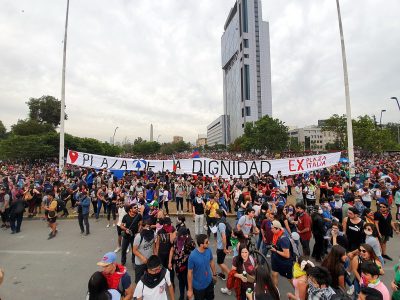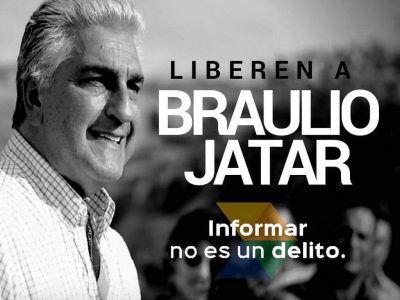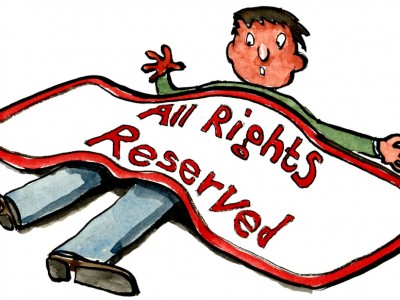Note: Article [es] by Derechos Digitales originally published in Spanish, translated by Silvia Viñas.
In the digital world, where the barriers to access information, knowledge, and culture have been significantly reduced, intellectual property protections can become an obstacle for freedom of expression (as we explained here [es, en], and saw, for example, in the testimony of Ciudadano Inteligente [es, en]).
In this new infographic [es] we want to be explicit and show you 10 common things we do on the Internet that should not be prohibited by intellectual property protections. The problem is that, although it might seem absurd, many of these things are common targets for hundreds of particular interests in the copyright industry.
Know your rights, use them and defend them. This way, you are also defending the Internet. #NoTemasaInternet [es] (Don't Fear the Internet)
You can expand the infographic (in Spanish) here [es].
Note: See English translation below graphic:

10 things that shouldn’t be prohibited in the digital world due to copyright (but that some still try to prohibit.)
Freedom of expression and the Internet go hand-in-hand. However, there are times when copyright, rather than encourage this freedom, works as a barrier to creativity.
1. ACCESSING SCIENTIFIC INVESTIGATIONS FREELY:
Access to scientific magazines increases each year at a rate greater than inflation. In May 2012, Harvard University reported that its libraries spend over 3 million dollars each year on serial publications.
2. HAVING FAST BROADBAND CONNECTIONS:
Industry representatives have pointed out [es] that “The telecommunication industry has obtained huge profits thanks to broadband. Their only justification is the transferring of music, video, and images.”
3. SHARING CONTENT WITHOUT COMMERCIAL PURPOSES
Currently, our copyright laws prevent private copies for non-commercial purposes, leaving us vulnerable to being accused of committing crimes against intellectual property. In countries like the United States, the industry has sued thousands of Internet users who share content through peer-to-peer systems like BitTorrent.
4. LINKING TO OTHER SITES
Lawyers in the industry have pointed out in the press [es] that “Indexing or linking to pirated material is cooperation in an act of public communication and is protected by intellectual property rights.” That, by the way, is not effective.
5. RECORDING VIDEOS OF PEOPLE DANCING
Something that seems clear-cut has generated lawsuits and requests to take down content, like in the case of Stephanie Lenz [es] in the United States, who filmed her son dancing to a song by Prince and posted the video on YouTube. The video-sharing platform removed Lenz's video when the copyright owner (Universal Music Publishing Group) claimed that this was violation of copyright. Lenz has challenged the claim in court.
6. CRITICISING AND MAKING FUN OF BRANDS AND PRODUCTS
Large companies don’t have a very good sense of humor, and they sometimes try to take legal actions when citizens and organizations criticise them. For example, Equifax, the company that owns Dicom, has presented a series of completely unfounded legal actions against the team that is producing the movie “I’m in Dicom.” [es]
7. REMIXING AND RECREATING OTHER WORKS OF ART
Today, with the Internet and digital technology, a big part of creativity is born out of the modification of already existing works. In many cases, the industry has sued authors for remixing songs or creating parodies and satires of other works of art, forgetting that “Everything is a remix.”
8. ACCESSING AND REUSING WORKS UNDER PUBLIC DOMAIN
[Works in the public domain] are not protected by copyright, so they can be copied, modified, and even sold freely. However, many websites are not rigorous [in evaluating the copyright status of works] and imply [es] that “all rights are reserved” over these works.
9. RESCUING FORGOTTEN CULTURAL WORKS
There are cultural works that are protected by copyright, but it is impossible to obtain authorization to use them because the authors are unknown or can’t be found. These works are called “orphan works” and in Chile there is no exception that permits the use of these type of works.
10. ACCESSING FREE AND OPEN CONTENT ON THE INTERNET
The dominant discourse says that EVERYTHING is protected by copyright such that sometimes we forget that there is a big free culture and free software movement. Even universities [es] forget.




7 comments
Thanks for this list. People dancing to an artist’s tune is free advertising not infringement. Like the other nine too. As a producer on intellectual property I surely want to get paid, but the current hunt down of people sharing without commercial purpose is just too much.
#3 still provides a challenge to me, however (SHARING CONTENT WITHOUT COMMERCIAL PURPOSES).
It strikes me that peer-to-peer systems are as often peer-to-stranger systems, which seems to me another thing altogether.
So, how does a content producer distinguish between those sharing content without commercial purposes and those sharing content in order to circumvent commercial purposes?
To effectively oppose the demands of the global copyright lobby, you
need to stop repeating their propaganda. For instance, “intellectual
property” and “protections”.
See http://www.gnu.org/philosophy/words-to-avoid.html.